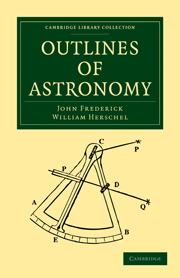Book contents
- Frontmatter
- PREFACE
- Contents
- ERRATA AND ADDENDA
- INTRODUCTION
- PART I
- CHAPTER I
- CHAPTER II
- CHAPTER III
- CHAPTER IV OF GEOGRAPHY
- CHAPTER V OF URANOGRAPHY
- CHAPTER VI OF THE SUN'S MOTION
- CHAPTER VII
- CHAPTER VIII
- CHAPTER IX OF THE SOLAR SYSTEM
- CHAPTER X OF THE SATELLITES
- CHAPTER XI OF COMETS
- PART II OF THE PLANETARY PERTURBATIONS
- PART III OF SIDEREAL ASTRONOMY
- PART IV OF THE ACCOUNT OF TIME
- APPENDIX
- INDEX
- Plate section
CHAPTER I
Published online by Cambridge University Press: 05 July 2011
- Frontmatter
- PREFACE
- Contents
- ERRATA AND ADDENDA
- INTRODUCTION
- PART I
- CHAPTER I
- CHAPTER II
- CHAPTER III
- CHAPTER IV OF GEOGRAPHY
- CHAPTER V OF URANOGRAPHY
- CHAPTER VI OF THE SUN'S MOTION
- CHAPTER VII
- CHAPTER VIII
- CHAPTER IX OF THE SOLAR SYSTEM
- CHAPTER X OF THE SATELLITES
- CHAPTER XI OF COMETS
- PART II OF THE PLANETARY PERTURBATIONS
- PART III OF SIDEREAL ASTRONOMY
- PART IV OF THE ACCOUNT OF TIME
- APPENDIX
- INDEX
- Plate section
Summary
(11.) The magnitudes, distances, arrangement, and motions of the great bodies which make up the visible universe, their constitution and physical condition, so far as they can be known to us, with their mutual influences and actions on each other, so far as they can be traced by the effects produced, and established by legitimate reasoning, form the assemblage of objects to which the attention of the astronomer is directed. The term astronomy itself, which denotes the law or rule of the astra (by which the ancients understood not only the stars properly so called, but the sun, the moon, and all the visible constituents of the heavens), sufficiently indicates this; and, although the term astrology, which denotes the reason, theory, or interpretation of the stars, has become degraded in its application, and confined to superstitious and delusive attempts to divine future events by their dependence on pretended planetary influences, the same meaning originally attached itself to that epithet.
(12.) But, besides the stars and other celestial bodies, the earth itself, regarded as an individual body, is one principal object of the astronomer's consideration, and, indeed, the chief of all. It derives its importance, in a practical as well as theoretical sense, not only from its proximity, and its relation to us as animated beings, who draw from it the supply of all our wants, but as the station from, which we see all the rest, and as the only one among them to which we can, in the first instance, refer for any determinate marks and measures by which to recognize their changes of situation, or with which to compare their distances.
- Type
- Chapter
- Information
- Outlines of Astronomy , pp. 10 - 56Publisher: Cambridge University PressPrint publication year: 2010First published in: 1864

